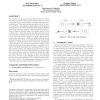Free Online Productivity Tools
i2Speak
i2Symbol
i2OCR
iTex2Img
iWeb2Print
iWeb2Shot
i2Type
iPdf2Split
iPdf2Merge
i2Bopomofo
i2Arabic
i2Style
i2Image
i2PDF
iLatex2Rtf
Sci2ools
131
click to vote
PE
2010
Springer
2010
Springer
Positive Harris recurrence and diffusion scale analysis of a push pull queueing network
We consider a push pull queueing system with two servers and two types of jobs which are processed by the two servers in opposite order, with stochastic generally distributed processing times. This push pull system was introduced by Kopzon and Weiss, who assumed exponential processing times. It is similar to the Kumar-Seidman Rybko-Stolyar (KSRS) multi-class queueing network, with the distinction that instead of random arrivals, there is an infinite supply of jobs of both types. Thus each server can either process jobs of one of the types, which it pulls from the other server, or jobs of the other type which it pushes out of the infinite supply towards the other server. Unlike the KSRS network, we can find policies under which our push pull network works at full utilization, with both servers busy at all times, and without being congested. We perform an asymptotic analysis of the push pull network under these policies to quantify its behavior: We show that under fluid scaling the ...
| Added | 29 Jan 2011 |
| Updated | 29 Jan 2011 |
| Type | Journal |
| Year | 2010 |
| Where | PE |
| Authors | Yoni Nazarathy, Gideon Weiss |
Comments (0)

